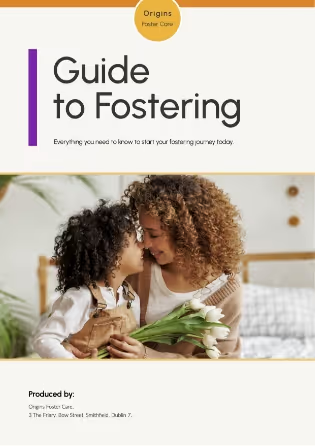
This article first appeared on The Irish Sun, written by Origins Foster Care's Catherine Gray.
Foster Care Fortnight — which ran from March 4-15 — is the annual campaign the organisation uses to raise the profile of fostering and to show how the service can transform lives.
Writing in the Irish Sun on Sunday this week, CATHERINE GRAY, of Origins Foster Care explains that, while challenging, foster care can be a rewarding experience that changes the lives of many vulnerable young people.
IN Ireland, foster care is the main form of alternative care for children in need of help and protection.
At the end of September 2018, 92 per cent of the 6,072 children in care were presently living in foster placements.
According to the most recent figures, there were only 3,827 foster carers on the Panel of Approved Foster Carers in Ireland.
This clearly leads to a huge deficit and it is a constant challenge for both Tusla and private fostering agencies to recruit foster carers.
Foster Care Fortnight, which ran from March 4–15, aims to promote the positive work foster carers do every day.
It also hopes to show how their commitment to the children they care for can yield very positive outcomes for all involved in the process.
Recruiting foster carers is not an exact science and requires a process that encourages complete transparency by families and individuals who apply to become foster carers.
In order to develop a relationship that allows for this level of transparency, there must be complete trust and respect between the applicants and the foster care agency.
Foster carers are central to successful outcomes for children in care. Those who find themselves within the foster care system have generally come from very complex family backgrounds.
In many cases, they have lived chaotic family lives due to their birth parents’ own difficulties and limited experience of good parenting.
Many children in care have been exposed to substance abuse, physical, emotional or sexual abuse, chronic neglect or have lived with parents who were suffering from serious mental health issues.
Regardless of the reason why a child comes into care, the common pattern for all children will be a sense of loss, feeling vulnerable, sadness, anger, instability and a general fear of the new environments they find themselves in.
It’s important that they have the opportunity to experience a gentle, positive, stable and caring home environment with their carers.
It is not an easy task to welcome a child into your home with no expectations but with many restrictions.
It is our job to wrap supports around our foster carers from recruitment through to placement of a child.
This support will come in many forms, from providing training that benefits the role of the foster carer, to allocating experienced fostering link social workers who provide the bridge between the foster carers and Tusla.
The success of a placement is very much reliant on a foster carer and their family feeling valued and respected in the important role they play in the lives of the children in their care.
So, what makes a good foster carer? There is a natural life cycle of a foster carer, and it is important the recruitment of carers and the criteria to which we measure them is kept current and in line with modern lives.
Today there are many different types of foster carers: single carers, couples with children, same-sex couples and couples with no children.
What is important is all foster carers have a good support network through families and friends, the ability to care for the needs of a child and most importantly — a genuine love for children.
There are specific criteria foster carers must meet, and these criteria are created to ensure the protection of the child and to support the foster carer.
When we ask our foster carers what they think are the key factors to being able to provide good foster care, the main responses are: not expecting too much too soon, being fair, understanding where the child has come from, a good sense of humour, listening and asking for help.
It is also important to remember why you wanted to become foster carers and what the child has been through.
There are many people who underestimate the invaluable life skills and experiences they have that could be the difference to giving a child in care the unique experience of being part of a loving family and the opportunity to reach their true potential.
Being a foster carer is undoubtedly a challenging role but what better achievement in life could you have than knowing you have been a major part in the story of a child that leads them to become a fulfilled and happy adult.
FOR information contact Origins Foster Care on 087 052 9749 or visit www.originsfostercare.ie


Reach out for any questions and enquiries. A member of our fostering team will get back to you as soon as possible.